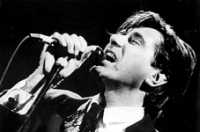While his tenure as the frontman for the legendary Roxy Music remained his towering achievement, singer Bryan Ferry also carved out a successful solo career which continued in the lush, sophisticated manner perfected on the group's final records. Born September 26, 1945 in Washington, England, Ferry, the son of a coal miner, began his musical career as a singer with the rock outfit the Banshees while studying art at the University of Newcastle Upon Tyne under pop-conceptualist Richard Hamilton. He later joined the Gas Board, a soul group featuring bassist Graham Simpson; in 1970, Ferry and Simpson formed Roxy Music.
Within a few years, Roxy Music had become phenomenally successful, affording Ferry the opportunity to cut his first solo LP in 1973. Far removed from the group's arty glam-rock, These Foolish Things established the path which all of Ferry's solo work -- as well as the final Roxy Music records -- would take, focusing on elegant synth-pop interpretations of Sixties hits like Bob Dylan's "A Hard Rain's A-Gonna Fall," the Rolling Stones' "Sympathy for the Devil" and the Beatles' "You Won't See Me," all rendered in the singer's distinct, coolly dramatic manner.
Roxy Music remained Ferry's primary focus, but in 1974 he returned with a second solo effort, Another Time, Another Place, another collection of covers ranging from "You Are My Sunshine" to "It Ain't Me, Babe" to "Smoke Gets in Your Eyes." His third venture, 1976's Let's Stick Together, featured remixed, remade and remodeled versions of Roxy Music hits as well as the usual assortment of covers. 1977's In Your Mind was Ferry's first collection of completely original material; the following year's The Bride Stripped Bare, a work inspired by his broken romance with model Jerry Hall, split evenly between new songs and covers.
Ferry did not record another solo album until 1985's Boys and Girls, a sleek, seamless effort that was his first "official" solo release following the Roxy break-up. For 1987's Bete Noire, he was joined by former Smiths guitarist Johnny Marr on the shimmering "The Right Stuff," and notched his only U.S. Top 40 hit with "Kiss and Tell." Another covers collection, Taxi followed in 1993; Mamouna, an LP of originals, appeared a year later, and in 1999 Ferry returned with a collection of standards, As Time Goes By. Another best of compilation Slave to Love: Best of the Ballads followed in fall 2000.
